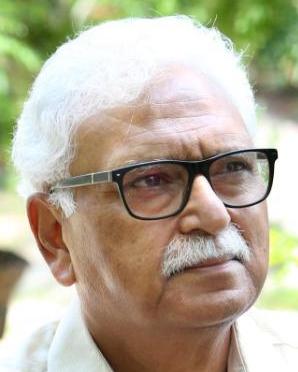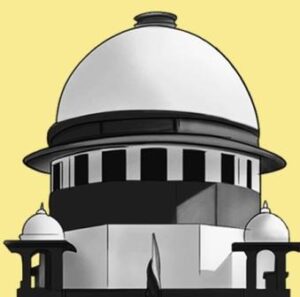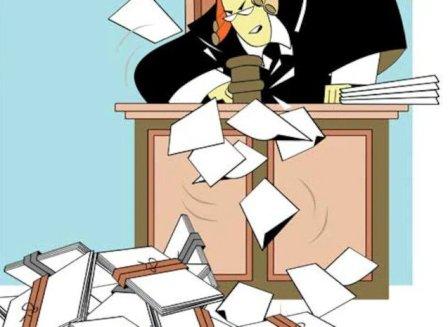

FOR MILLIONS OF ordinary citizens of the country, judiciary is the last hope for getting justice. Political leaders make a whole lot of promises or give assurances for ensuring justice but most forget about it once elections are won.
The bureaucracy, which is supposed to function as public servants, works more as obstruction for getting work done with officials considering their solemn duty to find faults on why the particular work can not be done.
 People then are are left with no other way but to approach the courts. No wonder we have the highest number of pending cases in various courts totalling about five crores.
People then are are left with no other way but to approach the courts. No wonder we have the highest number of pending cases in various courts totalling about five crores.
That’s not all, it is estimated that another five crore cases are pending before the parallel judicial system – patwaris, sub divisional magistrates, district magistrates and senior officers given power of adjudication.
To provide an instance – the private house of a friend in Chandigarh was sealed for minor violations 15 years ago. After the passing away of the owner his heirs had to run from pillar to post to get possession which they finally got recently.
No wonder we have the highest number of pending cases in various courts totalling about five crores.
This was made possible after they paid hundreds of visits to authorities at various levels of bureaucracy and then had to knock the doors of the high court and finally the Supreme Court to get the orders for possession of the house implemented.
 As Indians we are considered to be more prone to go to the courts even on minor issues. There is little provision to settle the issues at the first stage itself.
As Indians we are considered to be more prone to go to the courts even on minor issues. There is little provision to settle the issues at the first stage itself.
On top of it, the government is the biggest litigant with its involvement in over two-thirds of the cases.
Governments hire lawyers and judicial officers to keep appealing to higher courts whether there is justification or not.
No wonder a huge number of cases keep pending in the overcrowded courts. Some of these take two or three generations to get the final verdict.
But even as the cases keep mounting, the higher judiciary in the country has been sticking on to the British colonial legacy of closing down for winter and summer vacation.
 The annual summer vacation of the Supreme Court and High Courts starts in mid-May and lasts until June-end, and the winter break for two weeks starts in December-end.
The annual summer vacation of the Supreme Court and High Courts starts in mid-May and lasts until June-end, and the winter break for two weeks starts in December-end.
Besides, the higher courts close for a week each during Dussehra and Diwali.
Supreme Court Rules, 2013, provide that the Chief Justice of India can fix days for vacation so as not to exceed 103 days.
The high courts, meanwhile, enjoy 20 holidays in a year besides Christmas, winter and summer vacations.
On an average, the Supreme Court sits for 214 days a year, while the high courts have 210 working days.
This issue of huge backlog of cases and extended vacation for judges has come to focus again with a parliamentary committee coming out with its recommendations and calling the practice of long vacations as a “colonial legacy”.
 The Parliament standing committee on personnel, public grievances, law and justice has stated in its 133rd report that “the entire court going on vacation en masse causes deep inconvenience to the litigants”.
The Parliament standing committee on personnel, public grievances, law and justice has stated in its 133rd report that “the entire court going on vacation en masse causes deep inconvenience to the litigants”.
The higher judiciary does have a system of vacation judges but they look after only matters is urgent importance and don’t help in clearing the backlog.
Those in favour of vacation, mainly judges themselves and a section of lawyers, justify the long breaks by asserting that writing judgments is not like any other function. It involves extensive reading, hard work and intellect to come to a conclusion so that justice is not denied.
They also say that the hectic routine during normal working days does not provide them enough time to go through such an exercise.

There is some truth in the argument but shutting down the entire system for long periods remains unjustified.
Imagine if various departments of the government, or hospitals or banks close down for a few days in a year.
These days even corporate houses and even private universities have given away the practice of total closure.
It is, therefore, the recommendation given by the committee that individual judges could proceed on annual vacation at different periods in a year, rather than the higher judiciary closing down, is justified.
This recommendation was also made by former Chief Justice or India R M Lodha who had said that judges should take their leave at different times through the year so that the courts are constantly open and there are benches present to hear cases.
It is high time this reform is introduced and in the meantime the government and the judiciary must strive to reduce litigation – particularly at the first stage itself – by taking concerted measures. As is well known, justice delayed is justice denied. ![]()
___________
Also Read:
Drug Menace Cannot Be Addressed Without Addressing the Root Cause of Supply Chain
Deliberate Destruction of Indian Railways
Mughal Gardens – Name Changed, But Why?
Will SC Order Be Implemented When There Is Political Patronage For Hate Speech?
Time to build on synergy of ground energy & politics
Punjab – How a deadly cocktail of Agri-Water-Energy nexus going to destroy it?
North Pole and the ideological conflict of RSS & Hindutva

Disclaimer : PunjabTodayTV.com and other platforms of the Punjab Today group strive to include views and opinions from across the entire spectrum, but by no means do we agree with everything we publish. Our efforts and editorial choices consistently underscore our authors’ right to the freedom of speech. However, it should be clear to all readers that individual authors are responsible for the information, ideas or opinions in their articles, and very often, these do not reflect the views of PunjabTodayTV.com or other platforms of the group. Punjab Today does not assume any responsibility or liability for the views of authors whose work appears here.
Punjab Today believes in serious, engaging, narrative journalism at a time when mainstream media houses seem to have given up on long-form writing and news television has blurred or altogether erased the lines between news and slapstick entertainment. We at Punjab Today believe that readers such as yourself appreciate cerebral journalism, and would like you to hold us against the best international industry standards. Brickbats are welcome even more than bouquets, though an occasional pat on the back is always encouraging. Good journalism can be a lifeline in these uncertain times worldwide. You can support us in myriad ways. To begin with, by spreading word about us and forwarding this reportage. Stay engaged.
— Team PT


Copyright © Punjab Today TV : All right Reserve 2016 - 2024 |